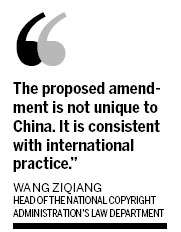|
 |
|
Pirated and illegal publications and audio-visual products are destroyed in Lhasa, Southwest China's Tibet autonomous region, on Tuesday. Regional authorities destroyed more than 230,000 such products on the day. [Photo / China News Service] |
Authorities hit all the wrong notes with musicians over proposed changes to the Copyright Law at a media seminar on Wednesday.

The draft amendment to the law, released on March 31 by the National Copyright Administration, allows sound recordings to be used by the non-copyright owners three months after the works are released. The current regulation, which states "no such work may be used where the copyright owner declares that use is not permitted", has been deleted.
The draft has come under fire from many famous songwriters and singers, who say the proposed amendment fails to protect their rights and gives too much power to collective management organizations.
While the administration solicits public opinion until the end of the month, it held the media seminar to explain the draft amendment.
"The proposed amendment is not unique to China. It is consistent with international practice. We deleted that article because it doesn't exist in the laws of the US, Germany, or Japan and South Africa, et cetera," said Wang Ziqiang, head of the administration's law department, in charge of drafting the proposal.
"The law is not aimed at protecting the interests of a certain group. It is to balance the interests of the copyright owners, the users and the consumers," Wang said.
"The fact that the works can be recreated by others after three months will benefit the public by providing them with different versions of one song."
However, Song Ke, a well-known musician, wasn't on the same key as Wang.
"The reality is that the rights of musicians have hardly been protected in China, where the awareness of intellectual property rights is still very weak," Song said at the seminar.
"It sound nice to say such things as 'balance the interests' but the new version of the law will only leave songwriters in a poorer position. Chinese consumers have already enjoyed so much for free, which they would have to pay for in other places."
He also noted that only five representatives from the music industry were involved in the 30-person drafting panel. The rest were scholars and government officials.
Wang agreed that the interests of the Chinese musicians were poorly protected at present, but he argued that the revision to the law will make copyright charges more feasible by clearly stating who has to pay, and that those who don't, will be punished.
Song said collective management organizations, such as the Chinese Music Copyright Society of China, for songwriters, and the China Audio-Video Copyright Association, for record companies, had done a poor job defending musicians' interests.
So the new draft was going in the wrong direction by authorizing these organizations to represent musicians over intellectual property rights, he said.
The draft proposes that those who wish to use copyright music, after applying to the NCA, acknowledge the copyright owners and pay them remuneration through the collective management organizations.
"At present, the government only allows one management organization for each category, and that monopoly is responsible for the organizations' poor performance. The law should not encourage the monopoly. It would be much better if we had options," Liu Huan, who sang the Olympic theme song You and Me at the opening ceremony of the Beijing Games, told Beijing News.
Wang agreed that the organizations were not working well and had problems regarding lack of transparency and communication with their members.
Wang also stressed that the NCA was still seeking and considering opinions and further amendments to the draft were possible.
tangyue@chinadaily.com.cn
